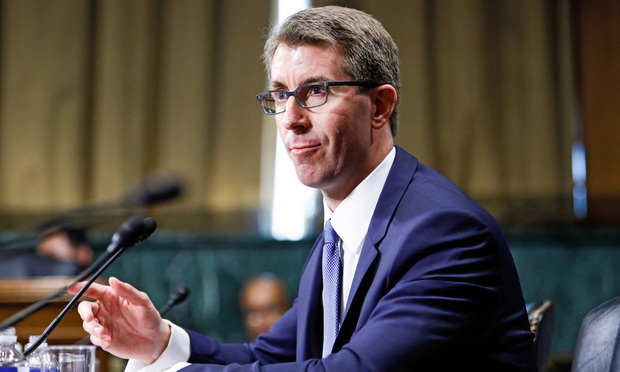Ninth Circuit Nominee Expresses Regret for Undergraduate Writings, but Insists He Didn't Hide Them
Ryan Bounds, the Oregon assistant U.S. attorney President Donald Trump nominated to the Ninth Circuit, expressed regret for the “overheated” and “overbroad” rhetoric he used in opinion pieces he wrote while in college, but said he hadn't intentionally withheld them from his home state senators' vetting committee.
May 09, 2018 at 01:16 PM
3 minute read
The original version of this story was published on The Recorder
 Ryan Wesley Bounds testifies before the Senate Judiciary Committee during his confirmation hearing to be U.S. circuit judge for the Ninth Circuit Court of Appeals on May 9, 2018. (Photo: Diego M. Radzinschi/ALM)
Ryan Wesley Bounds testifies before the Senate Judiciary Committee during his confirmation hearing to be U.S. circuit judge for the Ninth Circuit Court of Appeals on May 9, 2018. (Photo: Diego M. Radzinschi/ALM) During his confirmation hearing before the Senate Judiciary Committee, Ryan Bounds, the Oregon assistant U.S. attorney President Donald Trump nominated to the U.S. Court of Appeals for the Ninth Circuit, expressed regret for the “overheated” and “overbroad” rhetoric he used in opinion pieces he wrote while in college.
But at Wednesday morning's hearing, Bounds pushed back against the contention by Oregon's two Democratic U.S. senators—Ron Wyden and Jeff Merkley—that he intentionally withheld his undergraduate writings from the bipartisan committee they formed to vet nominees.
In February, the Oregon senators' vetting committee ranked Bounds among the top four candidates for the Ninth Circuit seat left vacant when Judge Diarmuid O'Scannlain took senior status at the end of 2016. But around the same time, a liberal advocacy group surfaced opinion pieces Bounds wrote for a Stanford University newspaper where he criticized “race-focused” student groups and decried people who “fancy themselves oppressed.”
Wyden and Merkley have since withheld forms giving their sign off to Bounds' nomination—so-called “blue slips—and urged Senate Judiciary chair Sen. Charles Grassley, R-Iowa, to hold off his confirmation hearing. Grassley, however, said at Wednesday's hearing that he gave his Oregon colleagues ample opportunity to advise the White House on the nomination.
Bounds, for his part, clarified that he attached all his undergraduate writings to the questionnaire he returned to the Senate Judiciary Committee in January, and that they were available on the committee's website. When Sen. Richard Blumenthal, D-Connecticut, asked why the “controversial” writings weren't provided directly to the Oregon senators' vetting committee, Bounds said Wyden's staff only asked him for writings going back to his law school days.
“I followed the instructions that his staff gave me in writing,” Bounds said.
Bounds said that his college articles were “perhaps clumsy efforts” to fight what he saw as discriminatory attitudes and practices on campus. Under questioning from Sen. Christopher Coons, D-Delaware, Bounds said he recognizes there are people from long-marginalized communities who “continue to face obstacles and continue to face discrimination.” He, in particular, discussed an instance where an LGBTQ colleague told him about being physically assaulted.
“How did that affect you?” Coons asked.
“It was very upsetting,” said Bounds, after choking up and pausing a moment.
The exchange marked the third time Bounds paused during his testimony after becoming emotional. The other two times were when speaking about his grandfather and O'Scannlain, for whom he clerked.
“It would be the honor of a lifetime,” said Bounds of O'Scannlain, “to follow in his footsteps even though his shoes are impossible to fill.”
This content has been archived. It is available through our partners, LexisNexis® and Bloomberg Law.
To view this content, please continue to their sites.
Not a Lexis Subscriber?
Subscribe Now
Not a Bloomberg Law Subscriber?
Subscribe Now
NOT FOR REPRINT
© 2025 ALM Global, LLC, All Rights Reserved. Request academic re-use from www.copyright.com. All other uses, submit a request to [email protected]. For more information visit Asset & Logo Licensing.
You Might Like
View All
‘Diminishing Returns’: Is the Superstar Supreme Court Lawyer Overvalued?

DC Lawsuits Seek to Prevent Mass Firings and Public Naming of FBI Agents
3 minute read
Trending Stories
- 1Roundup Special Master's Report Recommends Lead Counsel Get $0 in Common Benefit Fees
- 2Georgia Justices Urged to Revive Malpractice Suit Against Retired Barnes & Thornburg Atty
- 3How Gibson Dunn Lawyers Helped Assemble the LA FireAid Benefit Concert in 'Extreme' Time Crunch
- 4Lawyer Wears Funny Ears When Criticizing: Still Sued for Defamation
- 5Medical Student's Error Takes Center Stage in High Court 'Agency' Dispute
Who Got The Work
J. Brugh Lower of Gibbons has entered an appearance for industrial equipment supplier Devco Corporation in a pending trademark infringement lawsuit. The suit, accusing the defendant of selling knock-off Graco products, was filed Dec. 18 in New Jersey District Court by Rivkin Radler on behalf of Graco Inc. and Graco Minnesota. The case, assigned to U.S. District Judge Zahid N. Quraishi, is 3:24-cv-11294, Graco Inc. et al v. Devco Corporation.
Who Got The Work
Rebecca Maller-Stein and Kent A. Yalowitz of Arnold & Porter Kaye Scholer have entered their appearances for Hanaco Venture Capital and its executives, Lior Prosor and David Frankel, in a pending securities lawsuit. The action, filed on Dec. 24 in New York Southern District Court by Zell, Aron & Co. on behalf of Goldeneye Advisors, accuses the defendants of negligently and fraudulently managing the plaintiff's $1 million investment. The case, assigned to U.S. District Judge Vernon S. Broderick, is 1:24-cv-09918, Goldeneye Advisors, LLC v. Hanaco Venture Capital, Ltd. et al.
Who Got The Work
Attorneys from A&O Shearman has stepped in as defense counsel for Toronto-Dominion Bank and other defendants in a pending securities class action. The suit, filed Dec. 11 in New York Southern District Court by Bleichmar Fonti & Auld, accuses the defendants of concealing the bank's 'pervasive' deficiencies in regards to its compliance with the Bank Secrecy Act and the quality of its anti-money laundering controls. The case, assigned to U.S. District Judge Arun Subramanian, is 1:24-cv-09445, Gonzalez v. The Toronto-Dominion Bank et al.
Who Got The Work
Crown Castle International, a Pennsylvania company providing shared communications infrastructure, has turned to Luke D. Wolf of Gordon Rees Scully Mansukhani to fend off a pending breach-of-contract lawsuit. The court action, filed Nov. 25 in Michigan Eastern District Court by Hooper Hathaway PC on behalf of The Town Residences LLC, accuses Crown Castle of failing to transfer approximately $30,000 in utility payments from T-Mobile in breach of a roof-top lease and assignment agreement. The case, assigned to U.S. District Judge Susan K. Declercq, is 2:24-cv-13131, The Town Residences LLC v. T-Mobile US, Inc. et al.
Who Got The Work
Wilfred P. Coronato and Daniel M. Schwartz of McCarter & English have stepped in as defense counsel to Electrolux Home Products Inc. in a pending product liability lawsuit. The court action, filed Nov. 26 in New York Eastern District Court by Poulos Lopiccolo PC and Nagel Rice LLP on behalf of David Stern, alleges that the defendant's refrigerators’ drawers and shelving repeatedly break and fall apart within months after purchase. The case, assigned to U.S. District Judge Joan M. Azrack, is 2:24-cv-08204, Stern v. Electrolux Home Products, Inc.
Featured Firms
Law Offices of Gary Martin Hays & Associates, P.C.
(470) 294-1674
Law Offices of Mark E. Salomone
(857) 444-6468
Smith & Hassler
(713) 739-1250









